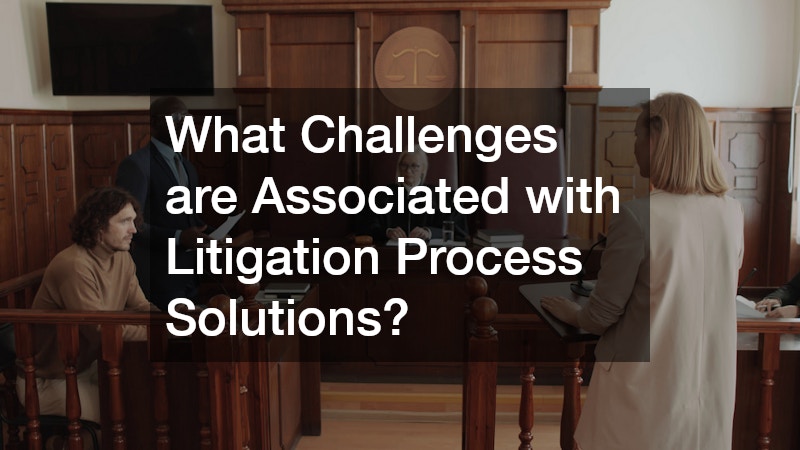Reasons to Have Litigation Process Solutions


This article explores the critical importance of having effective litigation process solutions. We aim to address common queries and provide insights into how these solutions can benefit various stakeholders in the legal process.
Why are Litigation Process Solutions Important?
Enhancing Efficiency
Litigation process solutions are designed to streamline complex legal tasks, significantly reducing administrative burdens. By automating routine processes, firms can allocate their time and resources more effectively.
The integration of these solutions allows legal teams to focus on core legal work rather than administrative minutiae. This enhanced efficiency can lead to quicker resolution of cases, benefiting both legal professionals and their clients.
Streamlined processes help reduce the potential for human error, further improving the pace and quality of legal services. Efficiency is not just about speed but about maintaining accuracy and consistency in legal proceedings.
Cost Reduction Benefits
One of the primary advantages of litigation process solutions is the cost-saving potential for law firms and their clients. By automating many labor-intensive tasks, firms can reduce their reliance on manual labor, which is often costly.
Additionally, streamlined processes can shorten the duration of litigation, further reducing expenses. For clients, this can translate to lower legal fees, making access to justice more affordable.
The cost-effectiveness of these solutions also extends to resource management, as firms can better allocate human and technological resources. Long-term financial savings can be substantial, contributing to the overall profitability of a legal practice.
What are the Key Features of Effective Litigation Process Solutions?
Automation and Technology Integration
Advancements in technology have made automation an essential feature of litigation process solutions. By integrating cutting-edge technologies, legal firms can enhance the productivity and efficacy of their services.
Automation reduces the need for manual data entry, improving the accuracy and speed of legal processes. This use of technology fosters a more dynamic and responsive legal practice.
The seamless integration of technology allows firms to keep pace with the ever-evolving legal landscape. It also positions legal practices to better manage workloads and respond quickly to new challenges.
Customizable and Scalable Options
Each legal firm has unique needs, making the customization of litigation solutions crucial. Effective solutions offer a variety of features that can be customized to fit the specific demands of a firm.
Scalability ensures that these solutions can grow with a law firm, accommodating increased workloads and additional users. This flexibility is vital for both small practices and large firms with diverse legal portfolios.
The ability to customize and scale solutions ensures that legal practices can maintain their competitive edge. It allows firms to provide tailored services to clients while adapting to industry trends and requirements.
How Do Litigation Process Solutions Impact Client Relations?
Improving Communication
Effective communication is a cornerstone of strong client relationships, and litigation process solutions can significantly enhance this. By providing clear, real-time updates, these tools improve transparency between legal professionals and their clients.
Clients appreciate being informed about the progress of their cases promptly. Enhanced communication fosters trust, which is essential for maintaining long-lasting client relationships.
Using these solutions, clients can receive consistent updates, reducing anxiety and confusion about legal processes. This clarity helps ensure that clients remain engaged and satisfied with the services they receive.
Enhancing Client Satisfaction
Streamlined litigation processes lead to more favorable outcomes, contributing to higher levels of client satisfaction. By resolving cases more efficiently, firms can meet client expectations and improve their reputation.
The reduction in case duration means clients face fewer disruptions in their personal and business lives. Satisfaction is further enhanced by the fact that clients are typically more willing to pay for services that deliver tangible value.
Ultimately, satisfied clients are more likely to recommend a firm to others, resulting in increased business and a robust client base. Client satisfaction is a key metric that litigation process solutions directly influence.
What Are the Long-Term Benefits of Implementing Litigation Process Solutions?
Strategic Growth and Development
Implementing effective litigation process solutions positions law firms for strategic growth. By developing more efficient processes, firms can expand their capabilities and tackle more complex cases.
These solutions provide a foundation for sustained business growth by increasing operational efficiency. Long-term, firms that leverage these tools can develop more effective business strategies.
The strategic use of technology allows firms to innovate and stay competitive in a rapidly changing industry. Growth and development are facilitated by the ability to respond effectively to new opportunities and challenges.
Risk Management and Compliance
Litigation process solutions play a critical role in managing risks and ensuring compliance with legal standards. These tools help firms maintain meticulous records and adhere to regulatory requirements.
By keeping comprehensive records, firms can better anticipate and mitigate potential legal risks. Compliance is enhanced through automated tools that monitor changes in legal regulations and practices.
The use of these solutions reduces the risk of legal malpractice and regulatory penalties. Effective risk management safeguards a firm’s reputation and contributes to its long-term success.
What Challenges are Associated with Litigation Process Solutions?
Integration and Adaptation Challenges
Despite their benefits, integrating new litigation process solutions can present challenges. Firms may face resistance from staff who are accustomed to traditional methods.
The adaptation process requires careful planning and adequate training. Without these, firms may struggle to fully realize the benefits of their chosen solutions.
To overcome these challenges, firms must invest in change management strategies that promote acceptance and proficiency. Successful integration hinges on the willingness of staff to embrace new technologies.
Security and Data Privacy Concerns
The digital nature of litigation process solutions introduces security and data privacy concerns. Firms must ensure that sensitive client data is protected against breaches and unauthorized access.
Data privacy is a growing concern, particularly with the increasing frequency of cyber threats. Solution providers must implement robust security measures to safeguard client information.
Addressing these concerns requires ongoing investment in cybersecurity technologies and practices. Ensuring data privacy is not only a legal obligation but a requisite for maintaining client trust.
.



